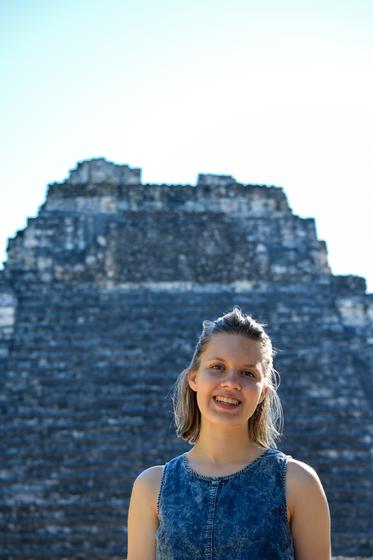"Being a part of the Honors College has played into the kind of person I always have been: someone who is thinking across disciplines," says Sophia Chapin.
Chapin has always brought this multidisciplinary perspective to bear, whether she's working on communications projects, environmental activism, or environmental science.
During her time at Mason, she spent a semester intensively studying conservation at the Smithsonian-Mason School of Conservation in Front Royal, which provides undergraduate students the opportunity to study at the prestigious Smithsonian Conservation Biology Institute. As a result of her time there, Chapin interned with the Clifton Institute in Warrenton, helping them with a data analysis project that illuminates the relationships between bird abundance and vegetation.
Chapin previously held an internship at Huntley Meadows park in Alexandria during the first few months of the pandemic. While working at Huntley Meadows, she participated in an environmental and water quality evaluation project.
This semester, Chapin has worked with a group of students who received funding from the Patriot Green Fund to re-establish trees and restore an environmentally degraded site on campus near where the College Apartments once stood.
Her excellence in the environmental sciences has complemented her commitment to environmental activism. Throughout the past year, Chapin has been involved with the Virginia Environmental Justice Summit, an event hosted by the Mason Environmental Justice Summit. During her time working on this project, she helped to organize the event, create and promote press releases, publish articles, and coordinate a highly professional social media presence. In doing so, she showed her commitment to inspiring others to join the environmental and climate justice movements, which seek to address systemic inequality as a part of responding ongoing environmental crises.
While developing and cultivating a commitment to environmental issues, Chapin has also become a formidable communicator.
Her journey as a communicator started during her first year at Mason, when she began writing about various social justice, cultural, and environmental issues for the Her Campus publication. During her first year, she also participated in the "Filming and Photography for Conservation" study abroad program in Nepal, which gave her an opportunity to explore her interests in conservation in connection with her skills as a communicator, while learning alongside students who were often pursuing careers in film or videography.
For the last two years, Chapin has been central to the Honors College Communications team, where she's managed a portfolio of communication projects that demonstrate her exceptional ability to tell compelling stories for a range of audiences. She often found opportunities to connect her strengths as a communicator with her academic interests by finding stories that make vivid the ways that the Honors College community is engaging with environmental issues. Her supervisor, Honors College Director of Communications Richard Todd Stafford, says of her: "Sophia is one of the strongest undergraduate communicators I have had the opportunity to work with; her awareness of audience, attention to detail, and ability to manage complex projects has improved the quality of every project she has touched."
Over the last year, as Chapin approached graduation, she took leadership over the Honors College alumni newsletter. In this role, she created the processes that enable the Honors College to reach its alumni community, while developing professional and interesting content that alumni would be interested in reading. Director of Advancement Valentino Bryant says that, ever since Chapin took over the project, alumni have been reaching out to him asking about how they can give back.
Leaving Mason, Chapin is interviewing for jobs that will give her the opportunity to combine these skills and interests. She says the Honors College helped her embrace the idea that she could find a multidisciplinary career: "I don't have to necessarily choose between environmental science and communications, but I can do something that is a hybrid of multiple things I'm interested in."


